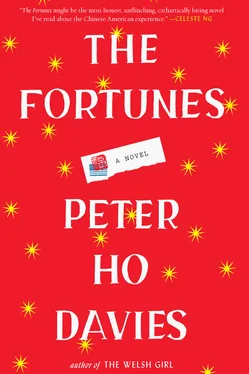“I felt you should know,” she said brusquely, squaring her shoulders under her lace shawl, “that I’m well aware of my husband’s occasional evenings.”
Ling started to say something, but she cut him off.
“Please don’t. He can deny it. Between a husband and wife there may be necessary mendacities. But you are not to think you know what I do not. Understood?”
“Yes, ma’am,” he murmured. He recalled Crocker confiding in him once his intention to name a town along the railroad after his wife.
“Very well.” She seemed to Ling as stiff and unyielding as the tightly stuffed and buttoned horsehair chair she sat upon. “These are Chinese girls, I assume?”
Ling nodded wretchedly.
“Well, that’s something. Your sort have a reputation for cleanliness, at least. And a Chinese girl displays a certain discretion. He could hardly fall in love with one, after all. And none would be so presumptuous as to try and make a claim on him.”
She looked at Ling and waited until he said quietly, “No, ma’am.”
He was jolted now by the train’s braking, the long caw of steel on steel drowning out the thrum of the wheels. He felt a sliding sensation in the pit of his stomach, as if something were loose inside him, as if his body wanted to keep going rather than stop. But it was the end of the line. He feared Crocker might roll off the divan and was about to reach out a hand when the big man grunted and stirred, catching himself. He sat up at once — the speed with which he moved his massive frame often made Ling want to jump — planted his feet, and looked about him for his hat. Ling offered it to him, and Crocker ran a palm over his head to smooth his hair and pulled it on tightly.
“Right!” he declared, spirits revived. “This is it. The front. Summit Tunnel.”
9.
Crocker stepped out onto the platform at the rear of the carriage as if onto a balcony. The train had pulled up on a narrow shelf next to a rough-hewn shack — the foreman’s office — resting akimbo on a railroad flatbed, the wheels sunk into stiff mud. Below, the land sloped away slowly and then more steeply to a narrow cut in the mountain through which the rails receded. The ground around the office was bare, churned by foot- and hoofprints and wagon ruts, dotted here and there by gnarled tree stumps, but downslope, fanning out from the rails that ran like a line of stitches through their midst, was a small city of tents like a miniature range of snowy mountains, smudges of smoke rising up between the peaks into the porcelain-blue sky. And between the train and the tents, filling every foot of ground with the exception of the track itself, were Chinese.
Ling had been ascending for so many hours now that looking downhill he felt as if he were toppling, had to put out a hand to steady himself for fear of pitching forward. He would have hung back in the doorway, but the big man wanted his buffalo fur — the snow had turned feathery and finally stopped and the sun come out, but in the shade it was still raw at this elevation — and Ling came forward to drape it over his shoulders, straining on tiptoes to lift it. On the hook beneath the robe he’d seen the rifle in its deerskin scabbard. “Will that be all?” he murmured, smoothing the collar over the pale roll of fat, splintery with stubble, at Crocker’s nape. He was hoping to withdraw from both the cold and the cold inquiry of the faces lifted to them, but Crocker shook his head, drew him forward. “Take a look, my boy. Take it all in! None of this would have been possible without your fine example.”
The big man’s basso seemed oddly muffled to Ling — it made him wonder if he’d been deafened by the engine — so instead of perusing the crowd he turned to Crocker, only to find his employer gazing back at him with a look of appraisal, his eyes as flat as in the old tintype portrait of him hanging at the mansion (the photographer had drawn them in because the exposure took too long for anyone not to blink). And then Ling’s ears popped and sound, like cold air, flooded into his head once more.
Ling was almost relieved when the foreman, Strobridge with his eye patch, strode toward them. He was wearing a moleskin coat, a pick handle swinging jauntily in his hand as if it were a walking stick.
“I’d have thought they’d be back at it afore now, Stro.”
Strobridge pulled himself up the ladder with one hand, spitting with gusto from the new elevation. “Oh, they’re feeling it, all right,” he noted grimly, his one good eye seemingly aimed at Ling.
He was accompanied by a chargeman called Kurtz, sporting a tightly curled imperial, and a dozen Irish crew chiefs, who ranged themselves around the rear of the palace car, all of them with picks or shovels on their shoulders as if ready to take up the work of the strikers. Just the kind of men the Chinese had displaced, now set over them. Ling overheard one of them, his beard streaked from one corner of his mouth with tobacco chaw, introduce himself to Crocker: “Name o’ Bill, sir, but you can call me Bill-in-a-China-shop, if you catch me drift.” The lopsided brown stain exaggerated his smirk grotesquely.
“Well, bring them up.” Crocker sighed irascibly. “And you,” he told Ling, “you translate.”
So that’s why he was here, Ling thought as he watched half a dozen Chinese approach the car at Strobridge’s wave: “These claim to speak for the rest.”
“By what right?” Crocker asked, and the foreman shrugged. “They’ve got the thickest heads.” To Ling, the men, most bareheaded, their shaved brows pale above the tan lines where their hats normally rested, looked breakable as eggs, even with the mass of workers arrayed behind them. He adjusted his own derby nervously, first tugging it low over his eyes, then tilting it back to cover his bare neck.
It wasn’t that the men didn’t speak English (albeit a pidgin version), Ling found, but that Crocker wanted to be sure of what they meant, as if he thought they might not really know the meaning of the word strike. The Chinese were belligerent — Ling wondered if their hostility was magnified by his presence, or if it was even for his benefit — and he found himself speaking their demands softly to Crocker, as if by mumbling he might lessen them. But it only made Crocker bark at him “Speak up!” and Ling blushed to be chastised by a ghost in front of these others. Not that Crocker didn’t yell at them too, inveigh against their duplicity. “We had a deal,” he blustered, the Irishmen chomping on their beards like horses at the bit around him. “You took the job at the wage we quoted. No one obliged you.”
Ling had barely translated these words — quietly, but forcefully, he hoped — when one of the men bawled back in English, “Ten hour a day good for white man, forty dollar a day good for white man, all the same good for China man.” The striker, a fellow with a nose so broad his nostrils seemed permanently flared in anger, glared at Ling until he turned to Crocker.
“They say…” he relayed haltingly, as someone else behind him added, “Same beatings as white workers, also!” “They say,” Ling continued, “that they wish equal… terms with other laborers on the line.”
“Tell him we don’t work to make him fatter!” another man, face shadowed under the brim of his hat, yelled in Chinese, to flickering laughter.
“I can’t tell him that,” Ling hissed.
The man pushed his conical bamboo hat back off his forehead, his face opening wide like an eye beneath a lid. Ignoring Ling, he pressed on in accented but dogged English.
“We no work for make you fat! We work for make we rich. We use mine gold, now we mine nothing. That’s what is tunnel: no-thing! We mine air only. You must give gold. No gold. No work.”
Читать дальше












